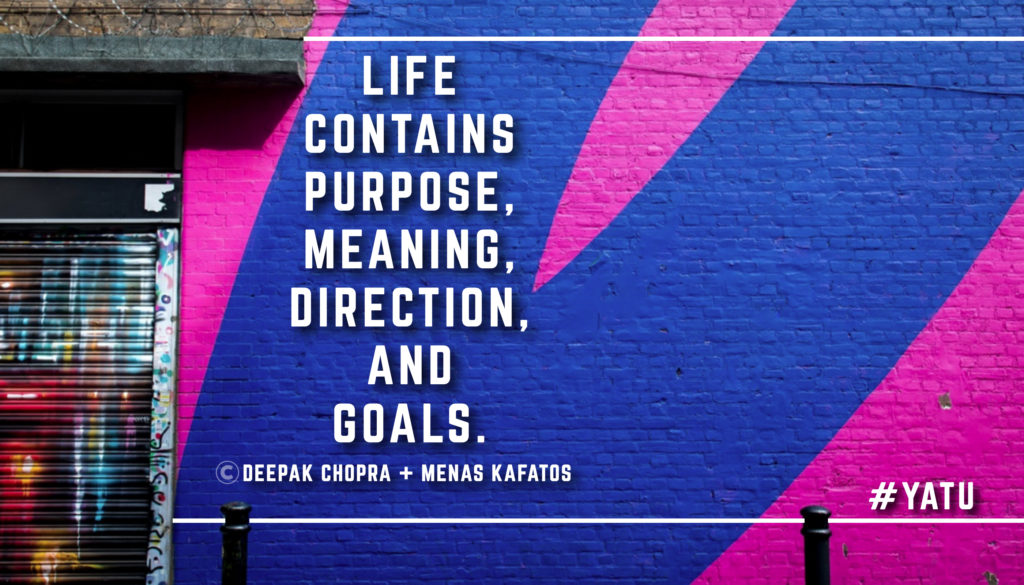By Deepak Chopra, MD
Einstein wasn’t the first person to state one of the basic facts of life when he said, “We cannot solve our problems with the same level of thinking that created them.” But most people attempt, time and again, to think at the level of the problem rather than finding the level of the solution. They continue to do what wasn’t working in the first place. They repeat the same actions expecting that this will lead to different results, when it almost never does.
In a new book, Metahuman, I confront this dilemma head on, starting with the notion that repeating the same futile action is endemic to our way of life. The vast majority of people are trapped inside routine, habits, old conditioning, secondhand beliefs, and the like. They repeat the past without being able to free themselves of the most painful memories. They are afraid of new, unknown things even though every creative idea or solution to a problem comes out of the new and unknown.
The whole complex of old thinking and habits burdens each of us in different ways, from stale relationships and boring jobs to ingrained prejudice and xenophobic nationalism. The rhythm of “same old, same old” beats incessantly, and yet somehow solutions are found, creativity flourishes, new ideas emerge, and “Aha!” moments occur unexpectedly.
Big money in Silicon Valley has been spent by corporations like Google, whose life blood is creativity and innovation, to unlock the secret of creative people and how they think. In their 2017 book Stealing Fire authors Steven Kotler and Jamie Wheal describe various attempts to turn creativity into a skill set, all of which essentially failed. It turned out that creativity is a state of consciousness, not a skill.
So the real question is how to arrive at this state of consciousness. It turns out that the level of the solution isn’t different for every problem. Certainly a physicist searching for a new subatomic particle thinks very differently from a mother trying to get her three-year-old to go to bed on time. Problems are specific, and yet oddly enough, solutions spring from the same source in consciousness. If we let this realization sink in, the repetition of “same old, same old” would cease, along with the mystery of how to live in the present moment.
In Metahuman I focus on two breakthrough ideas. The first is that consciousness is the fundamental “stuff” of creation, the second is that existence can take care of itself. These ideas can’t be unpacked here in a short space, but essentially they open the door to finding the level of the solution. If consciousness is the source of everything, it holds all solutions, and if existence can take care of itself, these solutions are always available. All you need to do is get out of the way and allow the natural process of creativity to bubble up from its source.
The restless, active mind is the level of the problem almost all the time—we aren’t speaking of natural disasters or the incursion of other people. The level of the solution lies deeper. “Deeper” implies levels of mind, which isn’t really accurate, but to simplify matters, it is helpful to use a word that implies getting away from superficial mental activity, the busy drone of thinking and reacting. “Closer to the source” makes the point more clearly, perhaps.
We experience new ideas all the time, yet the process is a mystery. We have no idea where we go to get our next thought, and most of the time it comes of its own accord. But when Shakespeare, Newton, or Mozart went inside, they accessed a level of creative thinking that was extraordinary. This level is silent, rich with possibilities, dynamically involved with life’s challenges, intuitive, and insightful. By contrast, most of us go inward and find much less of these qualities—never none, because the mysterious agency that produces thoughts, feelings, and sensations is at work in everyone.
The level of the solution isn’t hard to reach. Everything depends on what you find when you get there. Words meet their match when discussing this issue. Even to say that we go “inward” is a misnomer, because consciousness pervades the bodymind. It isn’t inside your head or inside a cell. Mind has no dimensions the way a dining room or an auditorium does. Because words fall short, only the experience of becoming more creative, insightful, and intuitive really counts.
Can we trigger the experience voluntarily? To some extent yes. Removing stress gives creative thinking a chance to emerge clearly. Being relaxed and open is necessary. Training in a particular field provides a grounding of knowledge and skill. But you can attend to all of these preparations and not make much progress when it comes to problem-solving, because you haven’t changed your state of consciousness. That is accomplished not by thinking about it but by actually going beyond your current state of consciousness.
I took the Greek word “meta,” which means “beyond,” to indicate what is necessary. Metahuman is a state of consciousness that goes beyond what we are normally used to. It doesn’t mean becoming freakish or some other comic-book connotation. The simplest description is waking up—you shift from an unconscious life to a fully conscious, alert, present life. Those are the characteristics of a shift in your state of consciousness. We have glimpses of feeling creative, insightful, intuitive, alert, and open to new experiences. The project of waking up involves taking these glimpses and making them a continuous experience. There is no better way to live. You get real about yourself, other people, and the world at the same time that solutions in all these areas emerge spontaneously, as nature intends them to.

